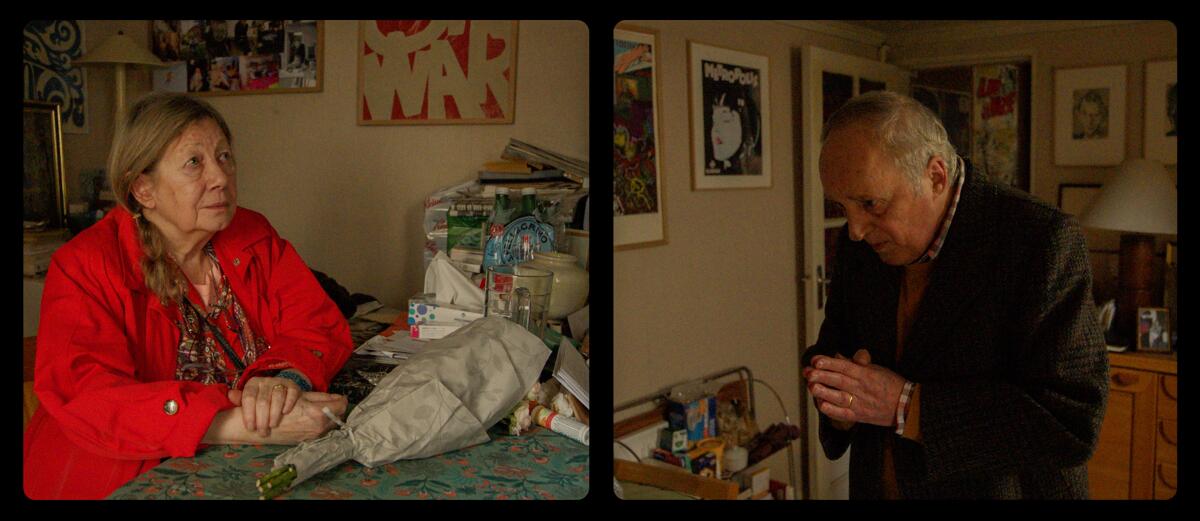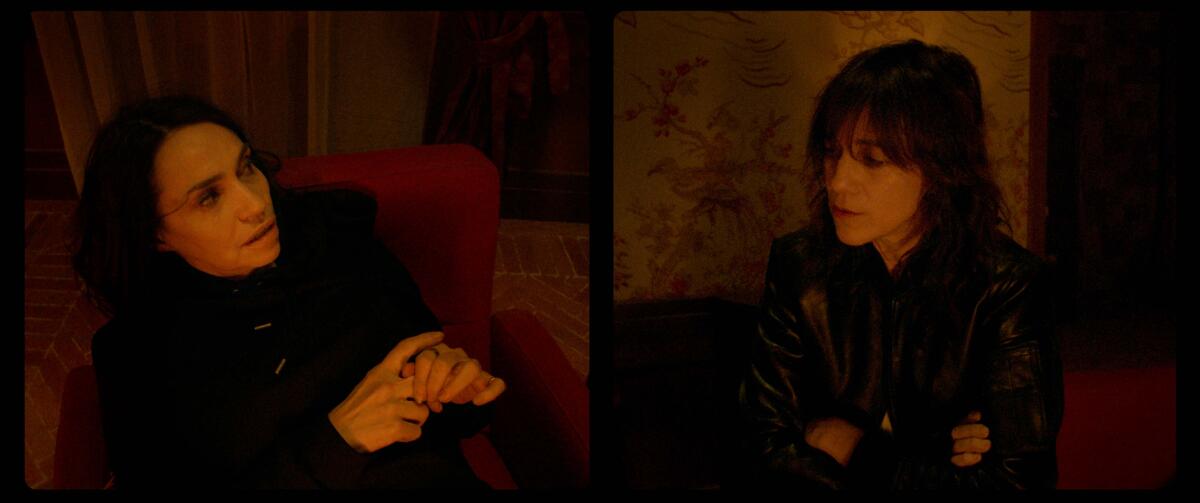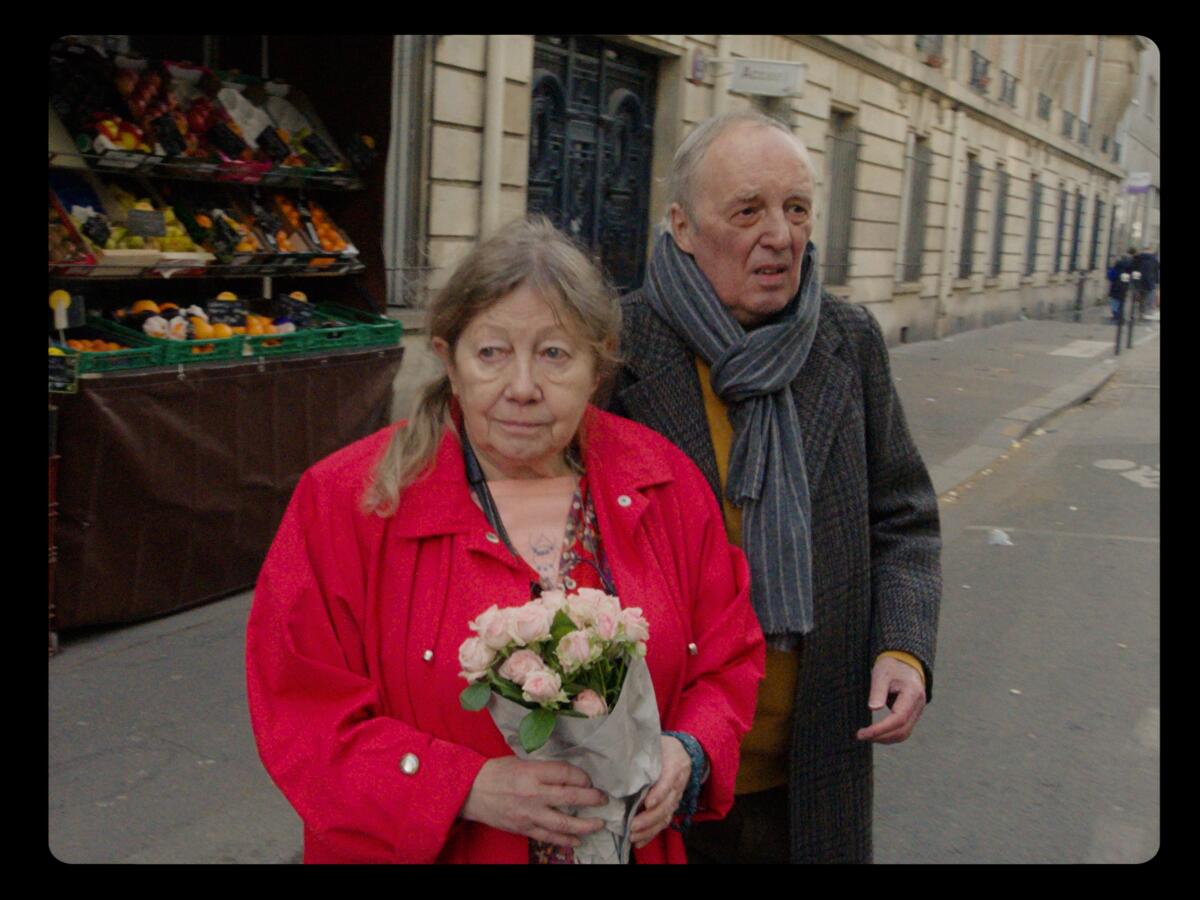Review: Gaspar Noé is up to his old tricks, and some new ones, with ‘Vortex’ and ‘Lux Aeterna’

The Argentina-born French director Gaspar Noé often is described as a polarizing filmmaker, but never before has he had two movies in American theaters in the same month, both of which seem to arise from vastly different poles of artistic sensibility and experience. “Vortex,” which premiered last summer at the Cannes Film Festival, is a 2½-hour monument to mortality, an unflinchingly intimate portrait of an elderly Parisian couple in their final weeks of life. “Lux Aeterna,” unveiled at Cannes in 2019, is a 52-minute film about filmmaking, a corrosive valentine to the industry as seen through a movie shoot gone terribly awry. For all their differences — of age, length and quality — both films serve to advance what has become, for Noé, an inexhaustible theory of cinematic chaos.
If you’ve ever seen one of his movies — perhaps you braved the psychedelic death trips of “Irreversible” and “Enter the Void,” or crashed the hellish dance party that was “Climax” — nothing about the extremity of his subjects or the intensity of his formal daring will surprise you. As shot by Noé’s longtime cinematographer, Benoît Debie, both “Vortex” and “Lux Aeterna” make extensive use of split-screen, with two different planes of action unfolding side by side. Both are also studies in entropy, one of this director’s most feverishly revisited themes, which can mean anything from the steady collapse of a social gathering to the painful untethering of the soul from the flesh. In journeys of dissolution and destruction, Noé pursues new realms of creative possibility.
For your safety
The Times is committed to reviewing theatrical film releases during the COVID-19 pandemic. Because moviegoing carries risks during this time, we remind readers to follow health and safety guidelines as outlined by the CDC and local health officials.
That’s the idea, anyway. Sometimes he’s just spinning his wheels, as is the case with the fitfully amusing, mercifully brief “Lux Aeterna” (which opens May 13). It begins with an odd, rambling fireside chat between two French acting gods, Béatrice Dalle and Charlotte Gainsbourg, here playing sly versions of themselves. Dalle is directing Gainsbourg in a low-budget film seemingly inspired by Carl Theodor Dreyer’s “Day of Wrath,” complete with witch-burning climax. Speaking of climax: As she and Dalle talk about the bad movies they’ve made and the awful directors they’ve worked with, Gainsbourg reminisces half-fondly about the time a teenage actor ejaculated on her leg mid-sex scene.
From there, things devolve into an unholy symphony of human bickering, sending the cast and crew of this film-within-a-film into a hellish collective meltdown. The split-screen format compounds the sense of escalating insanity. The atmosphere turns mutinous; a gloriously unhinged Dalle screams at everyone, and everyone screams right back. Gainsbourg gets a disturbing phone call from home and tries to fend off an industry sleaze (Karl Glusman, the star of Noé’s 3-D porn epic “Love”) who wants to cast her in his own low-budget craptacular. Meanwhile, Noé keeps calling our attention to the film-within-a-film’s witchy subject matter, drawing a none-too-subtle parallel between medieval-era witch burnings and the movie industry’s historic misogyny.

Here I should note that “Lux Aeterna” began life as a kind of auteurist fashion ad, with Yves Saint Laurent financing the production and outfitting the actors in exchange for a soupçon of Noé’s vision. This may invite your cynicism; it actually elicited my admiration. “Lux Aeterna,” to its credit, is a pretty terrible commercial and an undeniably fascinating experiment. Sarcastically punctuated by quotes from artistic giants like Dreyer, Godard and Fassbinder, it skewers the movie industry with playful contempt but also with an undimmed faith in the raw power of sound and image. The film-within-a-film ends with an on-set disaster — a burst of nightmarish imagery, all retina-scalding neon hues and strobe lighting effects — that might, for Noé, qualify as a kind of miracle.
No miracles are forthcoming in the long, slow marital death march of “Vortex.” For most of this movie’s 145 minutes we are with an aging, unnamed couple in the Paris apartment where they’ve lived for decades. The husband (Dario Argento), a writer and film scholar, has a heart condition; his wife (Françoise Lebrun), a retired psychiatrist, is succumbing to dementia. Their apartment, its walls lined with books and covered with movie posters, bespeaks a life happily devoted to artistic and intellectual pursuits. But now it has become a labyrinth, one whose cramped rooms and hallways they navigate with increasingly visible strain.
Noé’s split-screen formation frequently locks the characters into separate panels, isolating them from each other within their own home. There are moments when husband and wife come together and the two panels briefly form a near-whole, like a widescreen tableau with a seam running down the middle. This illusion of stability tends to arise whenever their son, Stéphane (Alex Lutz), comes over to visit, often with his own young son (Kylian Dheret) in tow. But Stéphane has problems of his own, including a drug addiction, and can’t always be there to take care of his parents. As they discuss possible arrangements for the future, their conversations turn agonizingly circular, devoid of hope or resolution.

You may recognize that hopelessness from other movies about dementia and infirmity, most notably Michael Haneke’s “Amour,” which “Vortex” somewhat resembles in its relentlessly single-minded focus on an elderly couple’s final days. And just as the Haneke film starred two French screen acting titans, so the extraordinary leads of “Vortex” leave their own poignant imprint. Argento, the famed Italian horror maestro (“Suspiria”), is entirely believable as a passionate cinema buff, but the gradual breakdown of his speech and the slowing of his body are something else entirely. Lebrun, the veteran star of Jean Eustache’s “The Mother and the Whore” (1973) and many others, is almost beyond praise. In her most powerful moments, she seems both present and absent: “I’m sorry,” she repeats over and over again in one unbearably moving scene, uncomprehending and yet, on a deeper level, entirely aware of what’s happening to her.
“Amour,” it’s worth remembering, was widely and somewhat misleadingly embraced as Haneke’s most mature work, a rare jolt of humanism from an auteur known for his cold, misanthropic visions. Similar perceptions may greet “Vortex,” which has already earned Noé some of the warmest notices of his erratic career. And it is a remarkable piece of filmmaking, rigorously controlled in ways that he doesn’t always evince: It’s a bone-deep sensory immersion that never feels merely sensationalist, anchored by two performances of astonishing commitment and emotional power.
Whether or not it is the work of a more mature Noé is a harder question to answer; so is the question of why we attach so much artistic value to maturity, or even humanism, in the first place. The director has spoken in interviews about the brain hemorrhage that he experienced and survived a few years ago, a flirtation with death that spurred him toward this sober cinematic reckoning. Still, he hasn’t relinquished all his formal excesses, the kind that once made him the button-pushing bad boy of French cinema. Nor has he lost his gift for pushing every moment to its expressive limits, the effect of which will be to either awaken your impatience or recalibrate your rhythms — or both.
In its astonishing, agonizing final moments, “Vortex” plays like a procedural on mortality, an unhurried accumulation of those moments that elude most movies on the subject: the final breath, the pronouncement of the inevitable, the shutting away of a body, the sense of a whole life being packed away. It’s another Noé death trip, in other words, and perhaps his most powerfully uncompromising.
‘Vortex’
In French with English subtitles
Not rated
Running time: 2 hours, 20 minutes
Playing: Landmark, West Los Angeles; and Regal Edwards Westpark, Irvine
‘Lux Aeterna’
In French with English subtitles
Not rated
Running time: 52 minutes
Playing: Sneak preview, May 12, Laemmle Monica Film Center, Santa Monica; Laemmle Playhouse 7, Pasadena; Laemmle Glendale; Laemmle NoHo 7, North Hollywood; starts May 13, Alamo Drafthouse, downtown Los Angeles; Laemmle Glendale
More to Read
Only good movies
Get the Indie Focus newsletter, Mark Olsen's weekly guide to the world of cinema.
You may occasionally receive promotional content from the Los Angeles Times.









